Boko Haram is a relatively well-known extremely violent militant Islamist group that began in Nigeria but is also active in Chad, Niger and northern Cameroon.
Its actions are extensively covered in news and analysis by The Defense Post.
The group’s leadership pledged allegiance to ISIS leader Abu Bakr al-Baghdadi and it became Islamic State’s West Africa province.
But the group later split into two factions, and journalists, analysts and others refer to those factions in different ways.
So this presents a journalistic conundrum: What is “Boko Haram” called, and how do we refer to its separate factions?
Explaining the problem fully requires a brief, incomplete and likely very debatable history of Boko Haram.
Western education is forbidden
The moniker “Boko Haram” is a phrase in the Hausa language and roughly translates as “western education is forbidden,” a local nickname referring to the strict Islamist ideology of a group founded in 2002 by Salafist cleric Mohammed Yusuf, whose kunya was Abu Yusuf al-Barnawi.
The group’s formal name is جماعة أهل السنة للدعوة والجهاد or Jama’at ahl al-sunna li-Da’wah wa-l-qital wal-Jihad (transliteration preferences dependent), which roughly translates as “People committed to the propagation of the Prophet’s teachings and jihad.” (Some references omit the word jihad.)
Yusuf’s goal was the creation of a fundamentalist Islamic state in Nigeria.
In the beginning the group concentrated on preaching and proselytization, building schools, camps and compounds for followers, although violence was certainly not unheard of. As is common, it began to radicalize. Confrontations with the Nigerian police and military increased, and they in turn adopted heavy-handed tactics, fueling escalations in the violence.
In 2009, hundreds of Boko Haram members were killed in military operations aimed at suppressing the group, including Yusuf who died in police custody.

Under new leader Abubakar Shekau, Boko Haram began its infamous campaign of extreme violence in earnest, notably using to great but grisly effect its trademark suicide bomb attacks that other African Islamist militant groups avoided, and Shekau made connections with al-Qaeda in the Islamic Maghreb (although according to some analysts, the group had already made connections with al-Qaeda under Yusuf’s leadership).
In 2014, Shekau declared a caliphate, and by 2015, the group controlled territory roughly the size of Belgium, but military counter-offensives inflicted massive losses and much of its territory was recaptured.
Shekau pledged bayat (allegiance) to ISIS leader Abu Bakr al-Baghdadi in March 2015 and Boko Haram became Islamic State’s West Africa wilayat or province.

But Shekau’s ruthless brutality, his definition of takfir and what constituted apostasy, and his targeting of Muslims among other things caused rifts to fester within the group.
In August 2016 he was replaced as leader, with ISIS appointing Abu Musab al-Barnawi, Yusuf’s son, who was the group’s spokesperson, in his stead. Some analysts say that Shekau was replaced because ISIS found him difficult to control.
Shekau rejected Barnawi’s appointment. Some contend that Shekau simply does not consider ISIS a legitimate authority, although he has not repudiated ISIS or rescinded his bayat to Baghdadi.
Boko Haram split into two major factions, with Shekau leading one faction and Barnawi the other.
Update March 16 Audio recordings have revealed that ISIS has replaced Abu Mus’ab al-Barnawi, appointing Abu Abdullah Idris bin Umar also known as Ibn Umar al-Barnawi as ISWA leader. ISIS has not yet made a public statement confirming the change.
Both factions claim to act as the Islamic State in West Africa, but only Barnawi’s faction is recognized by ISIS, and only actions carried out by Barnawi’s faction are reported by the ISIS central propaganda machine, although Shekau’s faction continues to release ISIS-style propaganda.
Both groups remain active, but Barnawi’s faction is by far the largest and is believed to be behind a significant surge of deadly attacks in recent months.
Neither faction has a new name, and this has led to some confusion and misattribution in reporting.
The (misattributed) attack in Rann
A notable case in point is the January 14 attack in Rann, around 175 km (110 miles) northeast of the Borno state capital, Maiduguri, near the border with Cameroon.
The attack began late in the afternoon. Nigerian government forces reportedly fled after militants attacked Rann and set fire to shelters for people made homeless by the conflict.
Many reports, including those from AFP and Reuters, attributed the incident to Islamic State West Africa province – which both news agencies use to mean the Barnawi faction – and many analysts and observers accepted those attributions.
The Defense Post report noted the attributions for the incident (full disclosure – we subscribe to AFP’s wire service and used its copy as the basis for our report), but we were not convinced that ISWA was responsible.
The attack, which focused on an IDP camp, appeared to better fit Shekau’s modus operandi – ISWA (for now) focuses on the military, while Shekau’s faction often hits softer targets.
Our report also noted an attack in Rann on December 6, saying it was unclear which faction was responsible for that incident – again large fire was set, apparently burning homes and a UNICEF clinic, pointing towards Shekau.

AFP’s attribution relied on a single aid aid worker 175 km away in Maiduguri who said colleagues in Rann blamed ISWA, while Reuters cited unnamed military sources saying ISWA was responsible without quoting them.
Two days later on January 16, Medecins Sans Frontieres (Doctors Without Borders) said that 14 people including three soldiers were killed in the assault on Rann, and that about 10,000 IDPs who were living in the camp had fled to the border.
Then, on January 17, Shekau’s faction claimed in a video that its fighters carried out the January 14 attack on Rann. An extract of the video published by Nigerian journalist Ahmad Salkida who broke the story appeared to show militants looting supplies from a storage facility and multiple structures on fire.
Reuters corrected its original attribution in its report on the video, but we haven’t seen many other corrections.

The problem of attribution seems to lie in the fact that both factions sprang from the same organization that has two names (or three if you’re pedantic), and both names could potentially describe either faction.
Nigerian media uses Boko Haram as a general term to describe the jihadist insurgency in the country.
Most branches of the military use the phrase Boko Haram terrorists (abbreviated to BHTs) to refer to militants, although the Nigerian Air Force appears to distinguish Islamic State West Africa province from Boko Haram.
Some journalists and analysts prefer to use the name Boko Haram to refer to the Shekau faction exclusively, while using ISWA to mean Barnawi’s faction, seemingly at odds with general usage.
Others use the acronym JAD for Shekau’s faction, based on the transliteration of the original formal name of the group.
Others appear to prefer to call the whole group ISWA, and split that into Shekau and Barnawi factions.
Boko Haram
We have decided to follow what is common in Nigerian media, using Boko Haram – which is only a nickname – as the overarching phrase to describe both factions when specific attribution is unclear. Both factions sprang from that group, and it’s informal, so it seems an obvious choice.
Islamic State West Africa
We use Islamic State West Africa province specifically to mean the Barnawi faction which is accepted by ISIS as its West Africa affiliate. We abbreviate that to ISWA, a relatively common initialism among analysts. (ISIS itself drops the “province” in much of its propaganda material.)
When we have evidence that an incident involves ISWA we say that, but we only attribute in headlines when we have sources pointing to ISWA, and usually only with a claim of responsibility from ISIS.

Abubakar Shekau faction
That leads us to the question of dealing with an incident attributed to the faction led by Abubakar Shekau – it did not create a new name for itself, so how should it be described?
It is not an “official” ISIS branch, so does it makes sense to describe it as an ISWA faction, even though it split from that group, and it’s actions are not recognized by ISIS central? It could be called an ISWA splinter group, but is that clear for the average reader?
Should it just be described as Boko Haram, without a nod to the split? Or as JAD?
After much debate, and to be clear for a general audience, we decided to refer to Shekau’s faction of Boko Haram, although using JAD has merit.
Barnawi also leads a Boko Haram faction, but in addition it’s ISWA.
I hope it’s clear, because this post has taken far too long to write and therefore contains too many words, although on the upside I was forced to refresh my knowledge of Boko Haram, however debatable that might be.
Another downside (or upside if you like to debate words as much as we do) – it leaves a hole where a post should be explaining how we use the terms “militant Islamist” and “jihadist” and probably many more.
P.S. I’m @ferguskelly over on Twitter if you want to debate…
Islamic State enforced leadership change in West Africa province, audio reveals


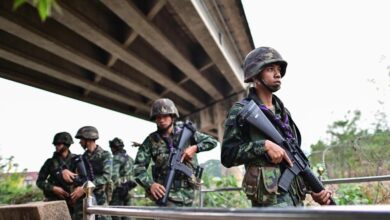
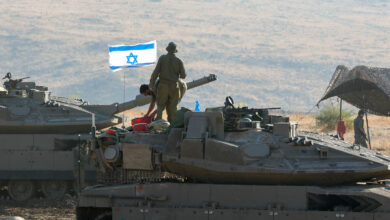
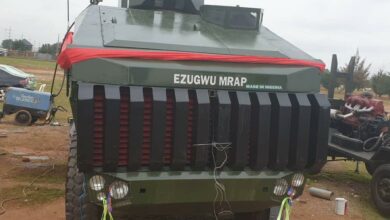
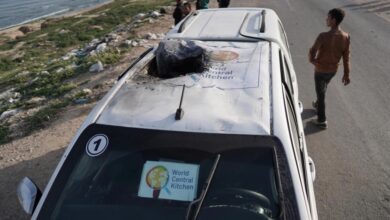
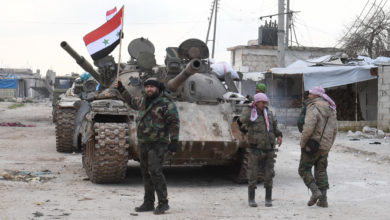

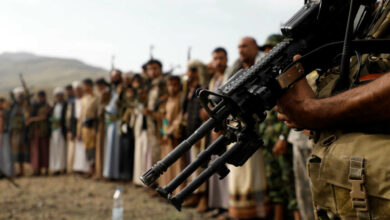
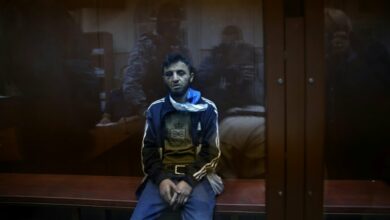
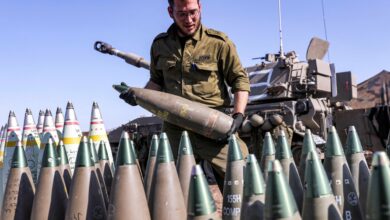
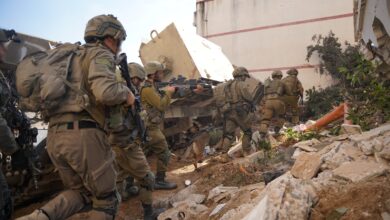
45 Comments